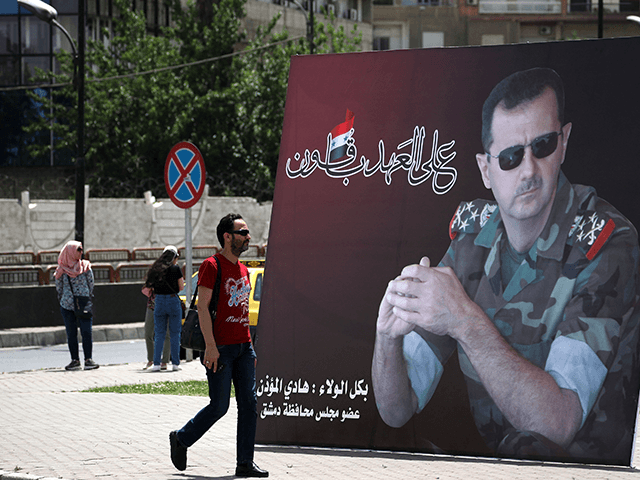Syria’s Supreme Constitutional Court on Monday approved three of the 51 applications submitted to run for president in the May 26 election.
Unsurprisingly, one of the three was incumbent dictator Bashar Assad, who has been in power since the year 2000 and fought a savage ten-year civil war, with Russian and Iranian assistance, to retain his grip on the throne.
The other two candidates approved by the court were Assad’s former deputy cabinet minister Abdallah Saloum Abdallah, who held that post from 2016 to 2020, and Mahmoud Marei, a member of the “tolerated opposition” who is seen as a stooge of the Assad regime by legitimate opposition leaders.
Bashar Assad is heavily favored to win his fourth seven-year “term” as president. He supposedly won the previous election in 2014, during the bloodiest days of the desperate civil war to dislodge him, with 88 percent of the vote.
The Supreme Constitutional Court, which consists entirely of Assad appointees, rejected the other 48 candidates without explanation. They nominally have three days to file an appeal. Applicants must be backed by at least 35 sitting members of the Syrian parliament, in which 177 of the 250 seats are currently held by members of Assad’s party.
Prospective candidates are also required to have lived in Syria for the past ten years, conveniently ruling out most of the real political opposition, as they long ago went into exile to escape the murderous dictator. For that matter, over half of the Syrian population is considered “displaced” at the moment, either internally or across the border into refugee camps or foreign asylum programs.
Al Jazeera News noted Assad has invited legislators from such pillars of democracy as Russia, Iran, China, Venezuela, and Cuba to observe his “election,” while the United States, United Kingdom, and Europe have denounced the ballot as a farce and refused to recognize its results.
The Western members of the U.N. Security Council in October accused the Syrian government of deliberately delaying the process of drafting a new constitution to avoid U.N.-supervised voting, as demanded by a December 2015 Security Council resolution. A free and fair vote in May 2021 was supposed to begin the process of transitioning Assad out of power.
U.N. officials say the upcoming election does not meet their “standards of transparency and accountability.” However, Russia blocked an effort last week by Western nations to have the U.N. Security Council reject the vote in advance, dismissing the motion as “unacceptable.”
Al Jazeera observed that Assad is “campaigning,” after a fashion, having taken measures such as “raising state salaries, cracking down on currency speculators and bringing the official exchange rate closer into line with the black market” to ease public discontent.
Opponents of the regime accused Assad of buying support and rewarding his allies with measures such as government-subsidized loans, with many of the giveaways directed at members of the small but powerful Alawite religious minority Assad hails from.

COMMENTS
Please let us know if you're having issues with commenting.